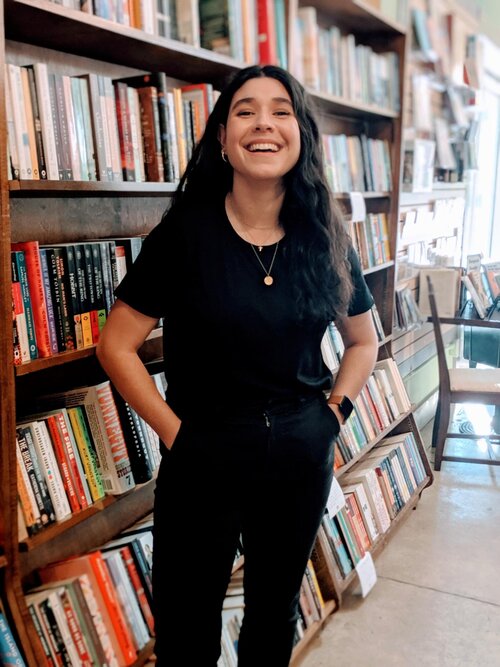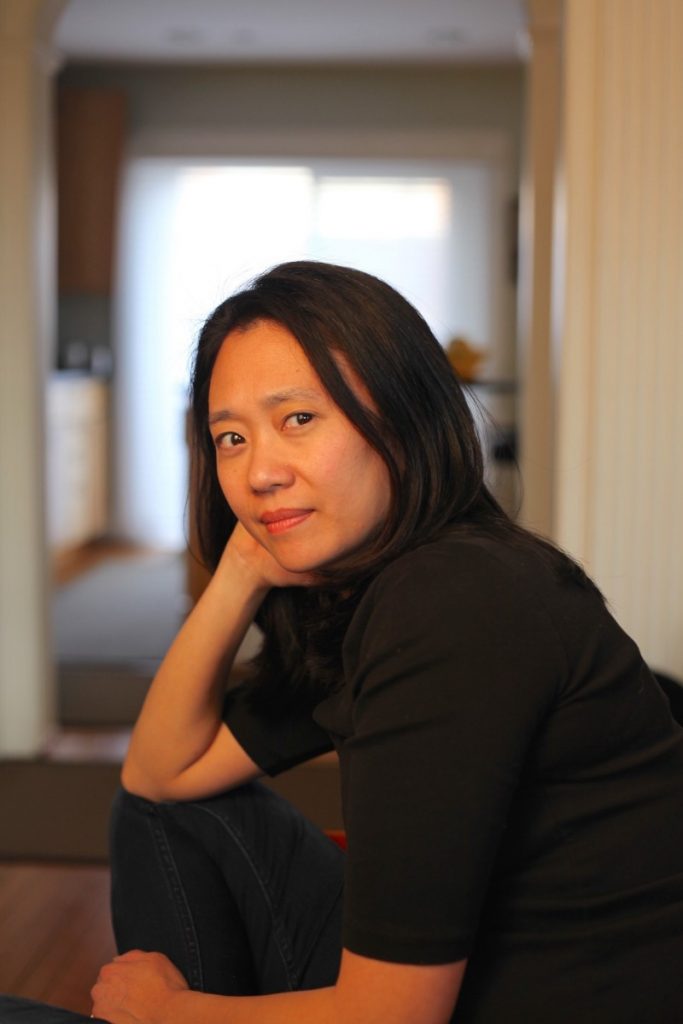
Leslie Sainz, whose poems “Self-Determination Theory” and “Propaganda Ghazal” appear in NER 42.4, talks with NER poetry editor Jennifer Chang about poetic space, ancestry, and her new role as NER‘s managing editor.
Jennifer Chang: I was struck by how space and syntax relate to and complicate each other in both “Self-Determination Theory” and “Propaganda Ghazal.” “Self-Determination Theory” depicts the domestic spaces that organize families, but with the twist: the mother in the living room and the father in the kitchen. Meanwhile, neither poem ever forgets the spaces of nations, the U. S. and Cuba specifically. Syntax separates these varied spaces into discrete lines, even as the formal space of the stanza binds what might not be literally (or even comfortably) together. For example, the taut, tense lines of “Self-Determination Theory” locked into a narrow single stanza, or in “Propaganda Ghazal” the radif of “side” playfully turning the poem this way and that until finally arriving at the “right side.” It’s exciting how you move your reader through spaces that are on the page, in the imagination, and across the global stage of history and geography. Even the Gertrude Stein epigraph, to me, struck me as an encroachment into the various spaces configured in that poem. What does space mean to you and what role does it play in your formal and rhetorical choices? Is it just me, or are these poems also private cartographies, the maps of Leslie Sainz’s mind and heart?
Leslie Sainz: It’s every writer’s dream to be read this closely, this carefully—thank you. I’ve come to understand space as a cunning thing—both material and abstract—able to transfigure to meet the desires of the poem. But it’s also beholden to time. In the poem, as in life, space is an entity and a relationship one can nurture, neglect, trace. I feel a particular kind of anxiety when coaxing space to do what I perceive the poem to want, and I try to honor space as the living memorial it is. It’s sort of like groundskeeping, you have to tend to the aesthetics of an area but also its functionality.
I have a strong affinity for associative work, for the paratactic sentence. It can feel as though there are whole lifetimes between thought A and thought B in my mind. Among friends and beloveds, I famously have a poor sense of direction, though I agree with your assessment that these poems are maps. “Self-Determination Theory” and “Propaganda Ghazal” were written a day apart in October 2020 and, perhaps in lieu of compasses, there are fistfuls of breadcrumbs between them.
JC: Follow-up question: Gertrude Stein?
LS: My fascination with Stein is boundless. I’d been studying Tender Buttons and Harryette Mullen’s Recyclopedia for a new persona project when these two poems materialized. I am deeply suspicious of poetry that presents its ideas as unquestionable, and at the time, I feared my current manuscript wasn’t doing all that it could to match the nuance of its subjects. “Self-Determination Theory” and “Propaganda Ghazal” were important exercises in intellectually disinheriting myself.
It’s interesting for me to consider your question about space in the context of Stein’s physical legacy, i.e., as a space-maker for fellow expatriates, and a self-proclaimed propagandist for Vichy France. The spaces she renounced, the spaces she saw fit for destruction. She left maps many of us pretend we do not know how to read.
JC: The father in both poems is rendered powerless, and he haunted me long after my first reading. By situating him in the kitchen in “Self-Determination Theory,” you upend gender conventions about the place of men and he’s then cuckolded by the United States, an occasion about which “though he is a jealous man, / he says nothing.” He’s similarly silenced in “Propaganda Ghazal” because we never learn the words to the Yanquis saying, though he “repeats” it in the first line, and then he’s, in a sense, vanquished from the poem. That powerlessness, I suspect, isn’t merely content, as there’s a lyric starkness to your work that suggests much is left unsaid. In my imagination, there’s a world of words that belongs to the father alone that might never be accessed. How does the interplay between power and patriarchy inform your poetics generally and your book project in particular?
LS: Fathers are especially good at haunting, aren’t they? As the daughter of Cuban exiles, I was made possible by estrangement and am a casualty of its compounding. I have mourned and continue to mourn, quite palpably, the lives I have lost by coming into being between “no longer” and “never was.” I’m also keenly aware of the privileges gifted to me by this liminality, and all of this—the historical, the political-personal—exists because of the mechanisms of power (both perceived and de facto), patriarchal dogma, and machismo. At present, I’m most interested in critiquing power and patriarchy by deferring to their inverses, which appear, to me, as spiritual connection, and partnership.
My book project, titled Have You Been Long Enough at Table, is named after an unassuming line of dialogue from The Old Man and the Sea, which is itself a monument to hegemonic masculinity. I wrote Have You Been Long Enough at Table with the hopes of disrupting the binary discourse that dominates Cuba-U.S. relations, and of honoring my imagined past, present, and future as a result of “the revolution within the revolution,” or, the emancipation of Cuban women. Over time, the poems revealed that my family system could be considered a microcosm of the very violence that displaced us.
JC: I’m a first generation Chinese American. That I am a poet bewilders my immigrant parents, who have never stopped asking me when I will write a novel. To them a story—prose fiction—makes sense, while a poem does not. How did you come to poetry and what does it mean to you to be writing poems as a first generation American?
LS: That parental preoccupation with sense-making, as you’ve described it, is very familiar to me. Though my immigrant parents are obsessive about their children securing the best credentials possible, I’m fortunate that they never actually enforced constraints on which fields of study we could pursue. I am grateful to come from a culture that reveres poets, to have been raised by parents who understand that poets can, and have, led revolutions. But I still have to, everytime I sit down to write, silence the voices—planted by my parents and perpetuated by my learned perfectionism—that insist I need to win X, publish in Y, and secure Z. No authentic artistic practice can cohabitate with these expectations. Instead, I actively build and adhere to systems and rituals that disorient me, in the best way, from anything that is not the page. For me, writing poems as a first generation American is to reject outcome thinking.
Ironically, the first poem I ever wrote was a mandatory display of nationalism. In third or fourth grade, our teacher tasked each of us with writing a poem in celebration of America for a county-wide writing contest. What did we know of America then? Of indoctrination and forced assimilation? I’m somewhat ashamed to admit that my poem was selected as one of the winners, and I was awarded a brand new bicycle and an obligatory photo-op with the then-mayor. When you come to something so young and are rewarded significantly for your efforts, there’s a biological impulse to chase that praise economy. Now, in every poem I write, I’m actively trying to redeem myself for that first poem. The bicycle, a kind of trophy, is still in my parent’s garage.
JC: Lastly, as a fan of your work, and because I am always eager for more poet friends, I am over the moon that you’ve joined New England Review as our new managing editor—congratulations and welcome! What do you love about being an editor, and in what ways does your editorial mind engage with your writerly mind (and vice versa)? What are your hopes for NER?
LS: It’s an absolute delight to serve as NER’s managing editor, and to call you a colleague and new friend!
Long before I became comfortable calling myself a poet (I still sort of shudder at the title), I proudly embraced the role of editor. Aside from the author and their guides, I can’t think of a vantage point closer to the process of writing and all its mysticism than that of the editor. This positioning—the exchange of trust that it requires—is a privilege, one that I don’t take lightly. Discovering diverse, challenging, and ambitious writing; fostering generations of new writers and readers—I’m grateful to be able to make a living doing what I love.
My editorial mind was once a saboteur to my writerly mind, though years of exposure have softened their relationship. Now, my editorial mind is more discerning than it is debilitating, and I hope its experience helps me recognize and avoid some of the tropes of the contemporary US style. My writerly mind humanizes my editorial mind, preventing it from forgetting the labor, costs, and sacrifices that created the work in front of me. There are many other ways in which these hemispheres interact, though these are, I think, the most mutually beneficial.
Thank you for giving me an opportunity to speak about my hopes for NER under my tenure! I would love to see NER become more widely recognized as a journal committed to uplifting the work of emerging writers and, more often than not, placing them in conversation with their literary heroes and ancestors. I believe NER to be a safe place for complex work—complexity of thought, language, feeling, etc.—and I hope our readers know that we trust that they’re capable of engaging with that complexity as they do everyday by leading their complicated lives.
As for my personal plans, I hope to fully usher NER into the digital age, replete with more opportunities for community-building and the exploration of craft. I’m also a big fan of our translations and international portfolios, and look forward to producing more of these features.

Jennifer Chang is the author of The History of Anonymity and Some Say the Lark, winner of the 2018 William Carlos Williams Award. Her poems have appeared or are forthcoming in The New Yorker, A Public Space, Poetry, Georgia Review, The Believer, The New York Times, and Yale Review, and she has published essays on poetry and culture in New Literary History, The Oxford Encyclopedia of Asian American Literature and Culture, The Volta, Blackwell’s Companion to the Harlem Renaissance, New England Review, and Los Angeles Review of Books.